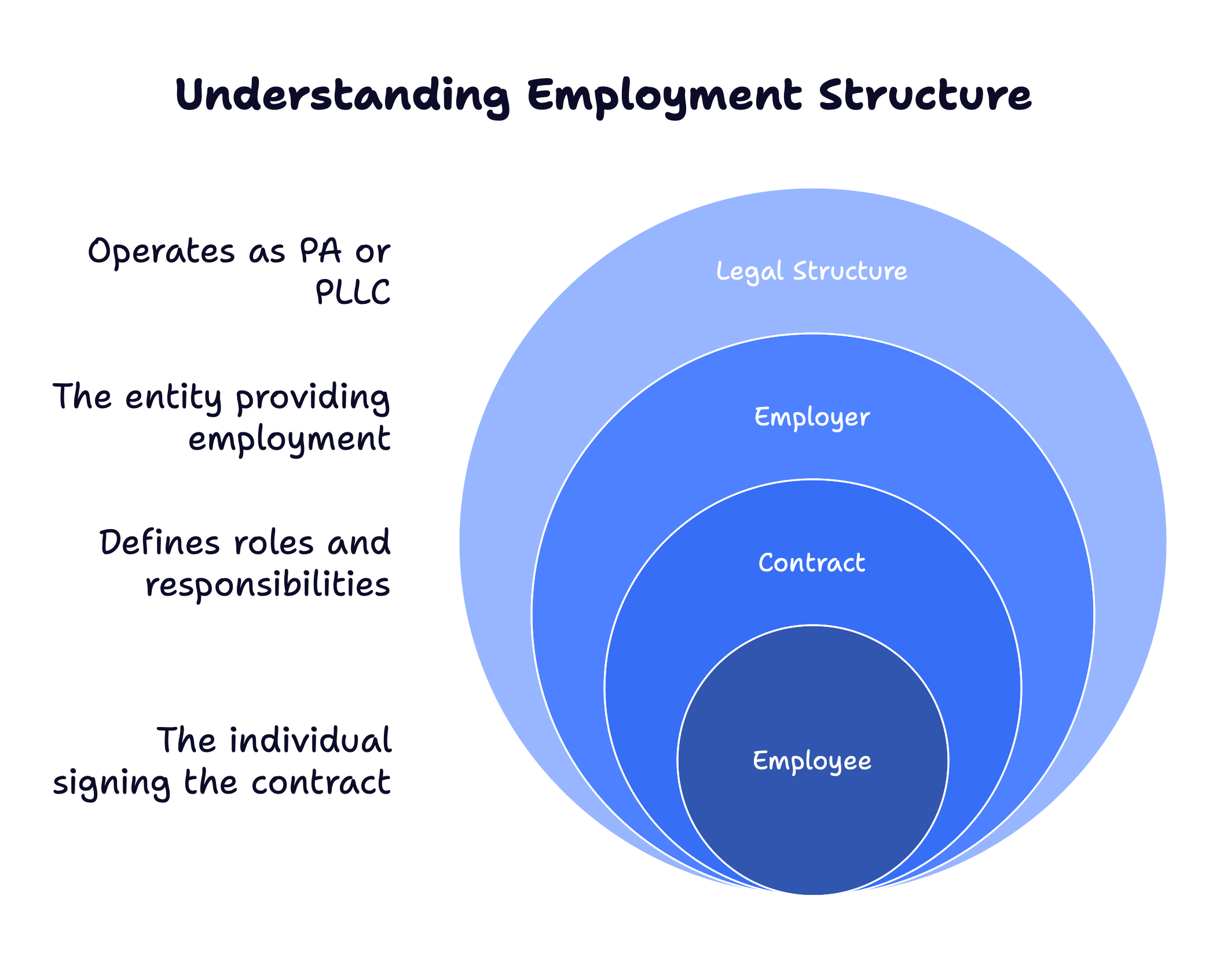
Who’s Actually Hiring You? Understanding the Parties in a Physician Contract
Key Takeaways
- Your employer isn’t just a hospital or a group - it’s a legal entity.
- Your contract will define you as the "employee" or "physician," and the employer as the "group" or "practice."
- Employers typically operate as professional associations (PAs) or professional limited liability companies (PLLCs).
- Knowing who signs your checks is just as important as knowing your salary.
1. Who Are You Actually Signing a Contract With?
You’d think this would be simple, right? You’re a physician. You get hired. You sign a contract. Boom, done.
Not quite.
- Your contract isn’t with the hospital or clinic itself.
- It’s with a legal entity that operates the practice.
- That entity could be a PA (Professional Association) or a PLLC (Professional Limited Liability Company).
And no, these aren’t just fancy business terms. They determine who controls your paycheck, your job security, and even your malpractice coverage.
2. What’s in a Name? (Why This Matters More Than You Think)
Ever signed something without really looking at the fine print?
You wouldn’t do that with a mortgage. So why do it with your job?
Your contract’s first paragraph will say something like:
"This agreement is between XYZ Medical Group, PLLC (the ‘Employer’) and Dr. [Your Name] (the ‘Employee’)."
Looks harmless, right? But:
- Is XYZ Medical Group a stable company, or did they just form last year?
- Do they have physician ownership, or are they run by private equity?
- If they go bankrupt, do you still get paid?
If you don’t check the employer’s legal standing, you could be signing a deal with a company that doesn’t even exist in five years.
3. PA vs. PLLC: What’s the Difference?
Here’s where things get a little technical - but stick with me.
Most physician employers are set up as PAs (Professional Associations) or PLLCs (Professional Limited Liability Companies).
| Entity Type | What It Means for You | Key Considerations |
|---|---|---|
| PA (Professional Association) | A group of physicians organized as a corporation. | Run like a business. More structure, more stability. |
| PLLC (Professional Limited Liability Company) | A hybrid between a partnership and a corporation. | More flexibility. May mean more financial risk. |
So which is better? It depends.
- PAs are usually more stable. If you’re joining a well-established group, it’s probably a PA.
- PLLCs can be riskier. If the owners are making bad business decisions, that risk can affect you.
Check the state records. Most states require these entities to file documents - you can look them up online.
4. Who Actually Owns the Practice? (And Why You Should Care)
Would you sign a lease without knowing who your landlord is?
No? Then don’t sign a contract without knowing who owns your employer.
- Is it physician-owned? Great, doctors probably have some say in decision-making.
- Is it private equity? That means profits might matter more than patients.
- Is it a hospital system? You might have more job security, but less negotiation power.
If you don’t know who owns the practice, you don’t know who’s really making the decisions that affect your job.
5. Could This Employer Disappear Overnight?
Ever heard of a medical group shutting down out of nowhere? It happens more than you think.
So before you sign:
✅ Look up the employer in your state’s business registry. Are they in good standing?
✅ Check their financial history. Are they profitable, or barely hanging on?
✅ See if they’ve been involved in lawsuits. A history of legal trouble is a red flag.
If a practice is unstable, your job is unstable. And no contract can protect you from that.
6. Know Who You’re Really Working For
Why would you sign a contract without knowing who’s paying you?
Before you sign:
✅ Find out if your employer is a PA or PLLC.
✅ Check their financial and legal standing.
✅ Ask who actually owns the practice.
✅ Make sure you’re not signing with a company that might disappear.
It’s not just about the salary - it’s about who’s running the show. Know the difference, and you’ll avoid signing a deal you regret.






